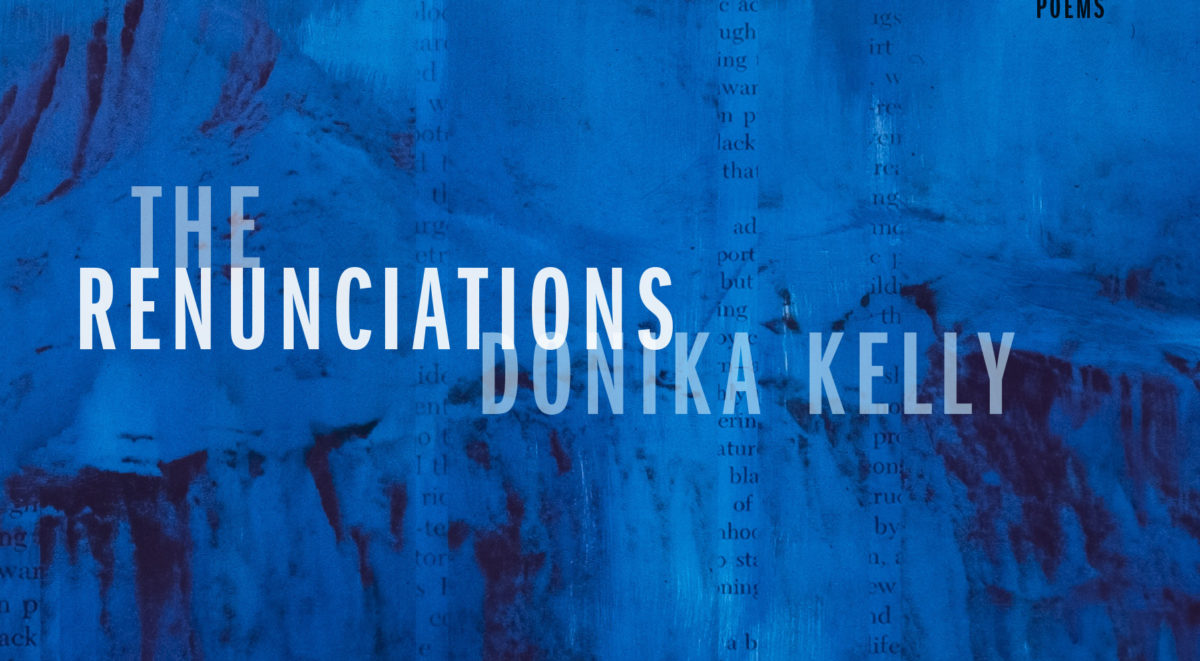
The Renunciations
Donika Kelly
Graywolf Press, 2021
Review by Stella Cali
Donika Kelly’s second collection of poetry, The Renunciations, begins with fire as a transitional force that overwrites the physical landscape of the speaker’s body. Standing in a field, “the undergrowth charred to ash,” the speaker longs to know their body “unworked.” “I was his dominion, a bit of land / turned to use. Where he plowed,” the speaker says of their father, “I was worn.” The Renunciations grapples with childhood abuse and trauma through myth, nature, and the body—animals, gods, and the land become entangled, swept and pulled by massive forces of fire and earth.
The connection between the body and the land, between the self and elements of nature, is an idea that Kelly comes back to again and again. Touching on fractures in her marriage, Kelly uses elemental forces to explore the relationship, comparing herself and her partner to swaths of land in “Continental Drift Theory,” where the speaker expresses a desire to “fix, / at the coast, the slow drift / that separated us.” Her partner’s body becomes a mapped terrain in “Cartography as an act of remembering,” the speaker recalling and tracing “each elevation, every / depression” when they are apart.
Rich with personal mythology, we experience these poems alongside a recurring presence: the oracle, a figure who knows how things will end and accompanies the speaker and the reader through the collection. The oracle dips in and out, appearing at key moments of memory; rooted in both the present and the past, the oracle serves as a connection across time. In “My Father Visits the Oracle Before I am Born,” the speaker’s father takes the oracle’s words as an excuse to “disavow” his control over his own actions and body. Years later, in “The Oracle Remembers the Future Cannot Be Avoided,” the oracle witnesses the speaker’s abuse, unable to change the outcome: “The oracle thinks, Run, / but the childmother’s leg doesn’t move. / The oracle thinks, Hide, but where?” When the speaker’s mother calls to ask about the abuse, the oracle knows that the speaker, after comforting her, will call back. Through the oracle, we engage with the past, the present, and the future of the individuals in this collection on the same plane.
At times, Kelly depicts her father as a god-figure or a celestial body—reminding us that gods in ancient myth, and stars in their truest form, are violent. In “From The Catalogue of Cruelty,” the speaker’s father swells in size when confronted by police at his door: “What is your name, sir? He answered: / Cronos. He answered: I’m hungry. He answered: / A god long dead. He threw up all his children.” In other moments, he is small: “I don’t know why I keep [ ].” he says to the speaker in “Self-Portrait with Father,” dwarfed by the child-speaker’s overwhelming answer: “You can stop.”
So much in this collection is communicated by what is left unsaid—a technique which Kelly employs literally, leaving blank spaces in place of words and dialogue:
the mother like a siren
dashing the daughter
against the question:
Did Daddy [ ]?
(“The Oracle Remembers the Future Cannot Be Avoided”)
Echoed in the erasure poems that dapple the text, and a series of poems addressed to an unknown person (“Dear—”) the absence of information holds space for complex meaning, as well as for a sense of loss. Even more notably, the unsaid-ness of things forms and shapes the speaker’s world and relationships. “He is sorry for [ ] me,” they say of their father in “Apologia II”, “but he will not admit [ ] me / to anyone outside this car. Not to / my aunts or great-aunts, not to my grandfather.” The words are not only unwritten, but also unsaid, their absence leaving space for the speaker’s family to create or exist in a reality in which the speaker was not abused.
The Renunciations ends where it begins, in the field left fallow. In this final poem, the speaker stands in the razed field—winter has passed, the land “a mud field” that the speaker calls “pasture.” In these final moments, the speaker feels ready to begin constructing a safer home within themselves. “About time to get a hammer,” they say, as they look out at the cleared land before them, and resolve to build.
Stella Cali is a queer writer and artist completing an MFA at the University of British Columbia. She lives and works on the traditional, ancestral, and unceded territory of the xʷməθkʷəy̓əm, Sḵwx̱wú7mesh, and sel̓íl̓witulh Nations.